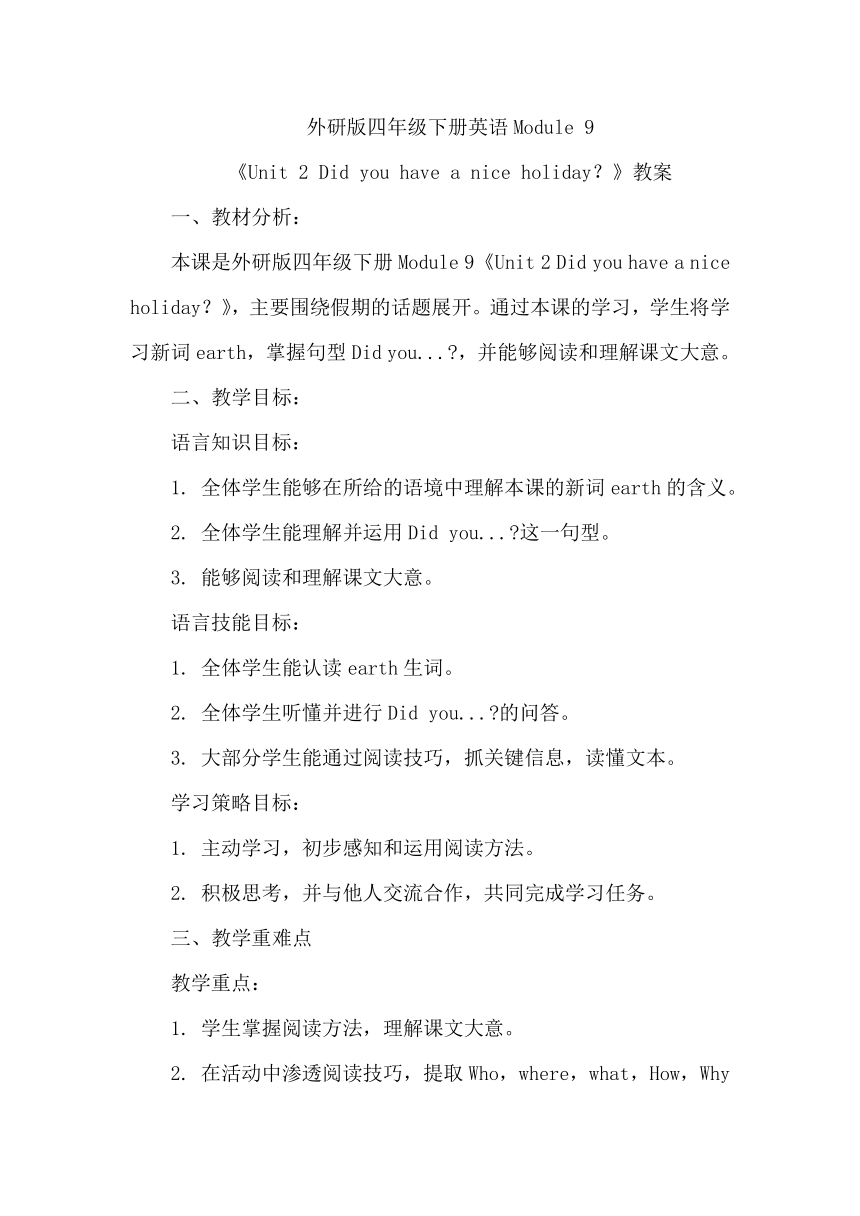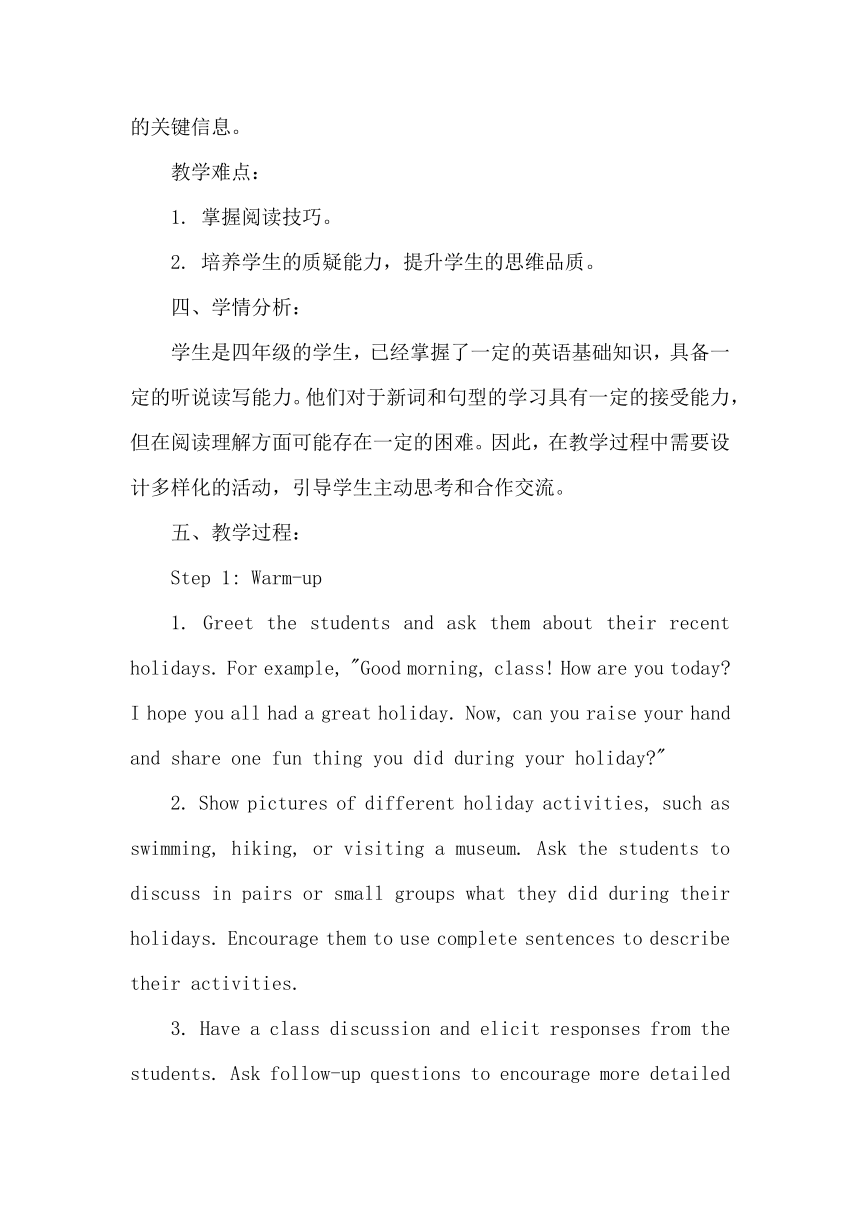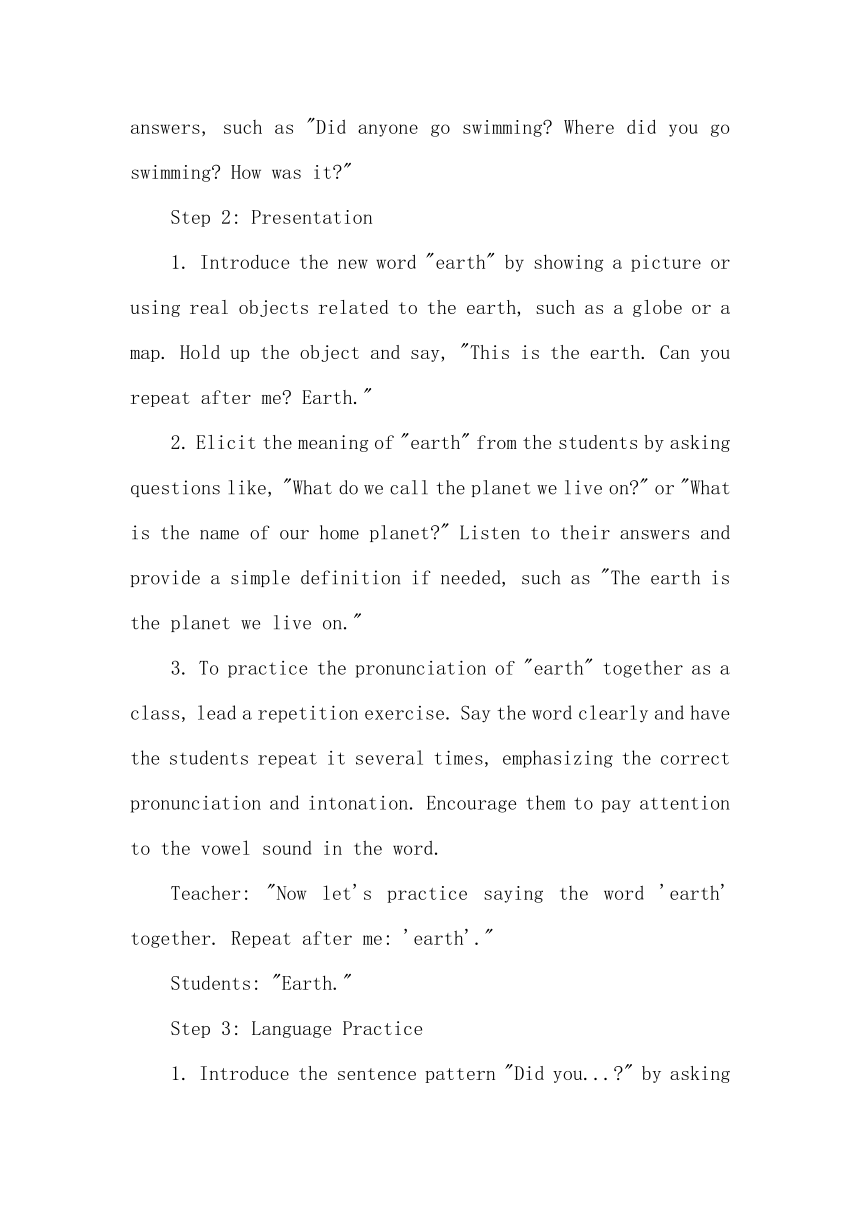Module 9 Unit 2 Did you have a nice holiday? 教案含反思
文档属性
| 名称 | Module 9 Unit 2 Did you have a nice holiday? 教案含反思 |  | |
| 格式 | docx | ||
| 文件大小 | 15.1KB | ||
| 资源类型 | 教案 | ||
| 版本资源 | 外研版(三年级起点) | ||
| 科目 | 英语 | ||
| 更新时间 | 2024-03-17 14:00:17 | ||
图片预览



文档简介
外研版四年级下册英语Module 9
《Unit 2 Did you have a nice holiday?》教案
一、教材分析:
本课是外研版四年级下册Module 9《Unit 2 Did you have a nice holiday?》,主要围绕假期的话题展开。通过本课的学习,学生将学习新词earth,掌握句型Did you... ,并能够阅读和理解课文大意。
二、教学目标:
语言知识目标:
1. 全体学生能够在所给的语境中理解本课的新词earth的含义。
2. 全体学生能理解并运用Did you... 这一句型。
3. 能够阅读和理解课文大意。
语言技能目标:
1. 全体学生能认读earth生词。
2. 全体学生听懂并进行Did you... 的问答。
3. 大部分学生能通过阅读技巧,抓关键信息,读懂文本。
学习策略目标:
1. 主动学习,初步感知和运用阅读方法。
2. 积极思考,并与他人交流合作,共同完成学习任务。
教学重难点
教学重点:
1. 学生掌握阅读方法,理解课文大意。
2. 在活动中渗透阅读技巧,提取Who,where,what,How,Why的关键信息。
教学难点:
1. 掌握阅读技巧。
2. 培养学生的质疑能力,提升学生的思维品质。
四、学情分析:
学生是四年级的学生,已经掌握了一定的英语基础知识,具备一定的听说读写能力。他们对于新词和句型的学习具有一定的接受能力,但在阅读理解方面可能存在一定的困难。因此,在教学过程中需要设计多样化的活动,引导学生主动思考和合作交流。
五、教学过程:
Step 1: Warm-up
1. Greet the students and ask them about their recent holidays. For example, "Good morning, class! How are you today I hope you all had a great holiday. Now, can you raise your hand and share one fun thing you did during your holiday "
2. Show pictures of different holiday activities, such as swimming, hiking, or visiting a museum. Ask the students to discuss in pairs or small groups what they did during their holidays. Encourage them to use complete sentences to describe their activities.
3. Have a class discussion and elicit responses from the students. Ask follow-up questions to encourage more detailed answers, such as "Did anyone go swimming Where did you go swimming How was it "
Step 2: Presentation
1. Introduce the new word "earth" by showing a picture or using real objects related to the earth, such as a globe or a map. Hold up the object and say, "This is the earth. Can you repeat after me Earth."
2. Elicit the meaning of "earth" from the students by asking questions like, "What do we call the planet we live on " or "What is the name of our home planet " Listen to their answers and provide a simple definition if needed, such as "The earth is the planet we live on."
3. To practice the pronunciation of "earth" together as a class, lead a repetition exercise. Say the word clearly and have the students repeat it several times, emphasizing the correct pronunciation and intonation. Encourage them to pay attention to the vowel sound in the word.
Teacher: "Now let's practice saying the word 'earth' together. Repeat after me: 'earth'."
Students: "Earth."
Step 3: Language Practice
1. Introduce the sentence pattern "Did you... " by asking the students questions about their holidays using this structure. For example, "Did you go swimming Did you visit any interesting places " Model the correct responses and encourage the students to answer using the same sentence pattern.
Teacher: "Now, let's talk about your holidays using the sentence pattern 'Did you... ' For example, I can ask, 'Did you go swimming ' and you can answer, 'Yes, I did. I went swimming at the beach.' Let's try it together."
Student 1: "Did you go swimming "
Student 2: "Yes, I did. I went swimming at the pool."
Teacher: "Great job! Now, let's continue with more questions and answers."
2. Organize a pair or group activity where students take turns asking and answering questions about their holidays using "Did you... " For example, one student can ask, "Did you go hiking " and the other student can respond, "Yes, I did. I went hiking in the mountains."
Teacher: "Now, I want you to work in pairs or small groups. Take turns asking and answering questions about your holidays using the sentence pattern 'Did you... ' Remember to use complete sentences. You can start with questions like 'Did you visit any interesting places ' or 'Did you try any new activities '"
Students work in pairs or groups, asking and answering questions about their holidays using the sentence pattern "Did you... " The teacher moves around the classroom, monitoring the students' conversations and providing assistance when needed.
Teacher (providing guidance): "That's great! Now, try asking follow-up questions to get more information. For example, if your partner says they went hiking, you can ask 'Where did you go hiking ' or 'How was the hiking trail '"
Step 4: Reading Comprehension
1. Divide the class into small groups and distribute copies of the reading passage to each group. The passage should be related to holidays or vacation experiences.
2. Explain the purpose of the reading task and introduce the key questions: Who, where, what, how, why. Write these questions on the board.
3. Instruct the students to read the passage silently and underline or circle the answers to the key questions. Encourage them to read carefully and pay attention to the details.
4. After reading, encourage the students to discuss their answers within their groups and justify their choices. They can take turns sharing their answers and discussing any differences or similarities.
5. Conduct a class discussion to check the students' understanding and elicit their answers to the key questions. Ask different groups to share their answers and provide feedback on their comprehension.
Step 5: Consolidation and Application
1. Ask the students to work individually and write a short paragraph about their own holidays using the sentence pattern "Did you... " For example, "Write a paragraph about your holiday activities. Start each sentence with 'Did you... ' and describe what you did during your holiday."
2. Provide a writing template or guide to support the students in organizing their ideas. Include sentence starters like "Did you go to any interesting places Did you try any new activities Did you meet any new friends "
3. Encourage the students to share their paragraphs with a partner and give feedback on each other's writing. They can discuss what they liked about their partner's paragraph and offer suggestions for improvement.
板书设计:
Unit 2 Did you have a nice holiday?
Did you...
Who Where What How Why
七、教学反思:
本节课通过引导学生讨论假期活动、介绍新词并练习句型,以及进行阅读理解活动和写作练习,全面培养学生的听说读写能力。在教学过程中,学生积极参与,能够理解和运用所学的句型和词汇。然而,对于阅读理解和提取关键信息的能力仍然需要进一步加强。因此,在以后的教学中,可以增加更多的阅读活动,提供更多的阅读材料,并针对提取关键信息的技巧进行训练和指导,以提高学生的阅读理解能力。教师在教学过程中要鼓励学生积极思考和合作交流,培养他们的质疑能力和思维品质。在组织活动时,可以设计更多的小组合作和互动环节,让学生在合作中共同完成学习任务。
《Unit 2 Did you have a nice holiday?》教案
一、教材分析:
本课是外研版四年级下册Module 9《Unit 2 Did you have a nice holiday?》,主要围绕假期的话题展开。通过本课的学习,学生将学习新词earth,掌握句型Did you... ,并能够阅读和理解课文大意。
二、教学目标:
语言知识目标:
1. 全体学生能够在所给的语境中理解本课的新词earth的含义。
2. 全体学生能理解并运用Did you... 这一句型。
3. 能够阅读和理解课文大意。
语言技能目标:
1. 全体学生能认读earth生词。
2. 全体学生听懂并进行Did you... 的问答。
3. 大部分学生能通过阅读技巧,抓关键信息,读懂文本。
学习策略目标:
1. 主动学习,初步感知和运用阅读方法。
2. 积极思考,并与他人交流合作,共同完成学习任务。
教学重难点
教学重点:
1. 学生掌握阅读方法,理解课文大意。
2. 在活动中渗透阅读技巧,提取Who,where,what,How,Why的关键信息。
教学难点:
1. 掌握阅读技巧。
2. 培养学生的质疑能力,提升学生的思维品质。
四、学情分析:
学生是四年级的学生,已经掌握了一定的英语基础知识,具备一定的听说读写能力。他们对于新词和句型的学习具有一定的接受能力,但在阅读理解方面可能存在一定的困难。因此,在教学过程中需要设计多样化的活动,引导学生主动思考和合作交流。
五、教学过程:
Step 1: Warm-up
1. Greet the students and ask them about their recent holidays. For example, "Good morning, class! How are you today I hope you all had a great holiday. Now, can you raise your hand and share one fun thing you did during your holiday "
2. Show pictures of different holiday activities, such as swimming, hiking, or visiting a museum. Ask the students to discuss in pairs or small groups what they did during their holidays. Encourage them to use complete sentences to describe their activities.
3. Have a class discussion and elicit responses from the students. Ask follow-up questions to encourage more detailed answers, such as "Did anyone go swimming Where did you go swimming How was it "
Step 2: Presentation
1. Introduce the new word "earth" by showing a picture or using real objects related to the earth, such as a globe or a map. Hold up the object and say, "This is the earth. Can you repeat after me Earth."
2. Elicit the meaning of "earth" from the students by asking questions like, "What do we call the planet we live on " or "What is the name of our home planet " Listen to their answers and provide a simple definition if needed, such as "The earth is the planet we live on."
3. To practice the pronunciation of "earth" together as a class, lead a repetition exercise. Say the word clearly and have the students repeat it several times, emphasizing the correct pronunciation and intonation. Encourage them to pay attention to the vowel sound in the word.
Teacher: "Now let's practice saying the word 'earth' together. Repeat after me: 'earth'."
Students: "Earth."
Step 3: Language Practice
1. Introduce the sentence pattern "Did you... " by asking the students questions about their holidays using this structure. For example, "Did you go swimming Did you visit any interesting places " Model the correct responses and encourage the students to answer using the same sentence pattern.
Teacher: "Now, let's talk about your holidays using the sentence pattern 'Did you... ' For example, I can ask, 'Did you go swimming ' and you can answer, 'Yes, I did. I went swimming at the beach.' Let's try it together."
Student 1: "Did you go swimming "
Student 2: "Yes, I did. I went swimming at the pool."
Teacher: "Great job! Now, let's continue with more questions and answers."
2. Organize a pair or group activity where students take turns asking and answering questions about their holidays using "Did you... " For example, one student can ask, "Did you go hiking " and the other student can respond, "Yes, I did. I went hiking in the mountains."
Teacher: "Now, I want you to work in pairs or small groups. Take turns asking and answering questions about your holidays using the sentence pattern 'Did you... ' Remember to use complete sentences. You can start with questions like 'Did you visit any interesting places ' or 'Did you try any new activities '"
Students work in pairs or groups, asking and answering questions about their holidays using the sentence pattern "Did you... " The teacher moves around the classroom, monitoring the students' conversations and providing assistance when needed.
Teacher (providing guidance): "That's great! Now, try asking follow-up questions to get more information. For example, if your partner says they went hiking, you can ask 'Where did you go hiking ' or 'How was the hiking trail '"
Step 4: Reading Comprehension
1. Divide the class into small groups and distribute copies of the reading passage to each group. The passage should be related to holidays or vacation experiences.
2. Explain the purpose of the reading task and introduce the key questions: Who, where, what, how, why. Write these questions on the board.
3. Instruct the students to read the passage silently and underline or circle the answers to the key questions. Encourage them to read carefully and pay attention to the details.
4. After reading, encourage the students to discuss their answers within their groups and justify their choices. They can take turns sharing their answers and discussing any differences or similarities.
5. Conduct a class discussion to check the students' understanding and elicit their answers to the key questions. Ask different groups to share their answers and provide feedback on their comprehension.
Step 5: Consolidation and Application
1. Ask the students to work individually and write a short paragraph about their own holidays using the sentence pattern "Did you... " For example, "Write a paragraph about your holiday activities. Start each sentence with 'Did you... ' and describe what you did during your holiday."
2. Provide a writing template or guide to support the students in organizing their ideas. Include sentence starters like "Did you go to any interesting places Did you try any new activities Did you meet any new friends "
3. Encourage the students to share their paragraphs with a partner and give feedback on each other's writing. They can discuss what they liked about their partner's paragraph and offer suggestions for improvement.
板书设计:
Unit 2 Did you have a nice holiday?
Did you...
Who Where What How Why
七、教学反思:
本节课通过引导学生讨论假期活动、介绍新词并练习句型,以及进行阅读理解活动和写作练习,全面培养学生的听说读写能力。在教学过程中,学生积极参与,能够理解和运用所学的句型和词汇。然而,对于阅读理解和提取关键信息的能力仍然需要进一步加强。因此,在以后的教学中,可以增加更多的阅读活动,提供更多的阅读材料,并针对提取关键信息的技巧进行训练和指导,以提高学生的阅读理解能力。教师在教学过程中要鼓励学生积极思考和合作交流,培养他们的质疑能力和思维品质。在组织活动时,可以设计更多的小组合作和互动环节,让学生在合作中共同完成学习任务。
同课章节目录
- Module 1
- Unit 1 She's a nice teache
- Unit 2 He's cool.
- Module 2
- Unit 1 London is a big city.
- Unit 2 It's very old.
- Module 3
- Unit 1 Robots will do everything.
- Unit 2 On Monday I'll go swimming.
- Module 4
- Unit 1 Will you take your kite?
- Unit 2 Will it be hot in Haikou?
- Module 5
- Unit 1 I was two then.
- Unit 2 They were young.
- Module 6
- Unit 1 Were you at home yesterday?
- Unit 2 Was it a big city then ?
- Module 7
- Unit 1 I helped Mum.
- Unit 2 Grandma cooked fish.
- Module 8
- Unit 1 They sang beautifully.
- Unit 2 I took some pictures.
- Module 9
- Unit 1 Did he live in New York ?
- Unit 2 Did you have a nice holiday?
- Review Module
- Unit 1
- Unit 2
- Module 10
- Unit 1 Did you fall off your bike?
- Unit 2 Sam had lots of chocolate.
